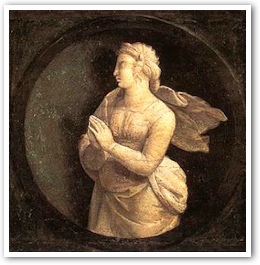The Holy Spirit and Prophecy
- KENNETH BAKER, S.J.
The concluding statement of the Nicene Creed about the Holy Spirit is that He spoke through the prophets.
 |
The reference is primarily to the prophets of the Old Testament, including such giants as Isaiah, Jeremiah, Ezekiel, Amos and Hosea.
In the Old Testament a prophet is not primarily one who predicts the future. The idea of a prophet as one who predicts future events is a popular conception that corresponds with only a part of the function of the true prophet. A prophet is simply someone, inspired by God, who speaks in the name of God and who expresses God’s commands or his promises.
Certain traits distinguish the prophets of Israel. In the first place, a prophet is constituted by a divine call. This is evident in the call of Isaiah, Jeremiah, and Ezekiel (see Is 6:5 ff.; Jer 1:9; Ezek 3:1 ff.). The prophet is always called by God for a religious purpose — he receives a divine mission. That mission is usually to proclaim the Word of God to Israel or to some specific individual, such as Nathan rebuking David for his adultery with Bathsheba (2 Sam 12:1-15).
The true prophets encounter great trials and suffering in the process of bringing the will of God to their fellow men. Jeremiah, conscious of the responsibility of being a prophet, begged God to leave him in peace and to find someone else to do the prophesying (see Jer 1). Under the kings in Israel and Judah the prophets were often executed (Jer 2:30; 26:20-23). Thus Jesus was able to say: “O Jerusalem, Jerusalem, killing the prophets and stoning those who are sent to you…” (Mt 23:37).
In the Old Testament “the Spirit of the Lord” descends on the prophet and he speaks. Thus there is a close association between the Spirit and the human activity of speaking. The prophets counseled the community of Israel, they rebuked her, they denounced the kings and the wealthy oppressors of the poor, they spoke about the “Messiah” — the mysterious anointed king who would one day come to redeem Israel.
In the New Testament Jesus is vividly described in terms that indicate a Spirit-filled prophet who is mighty in word and deed. Although he does not call himself a prophet explicitly, he is referred to by others a number of times as a great prophet from the Lord. The Holy Spirit is active in his conception (Lk 1:35; Mt 1:20), leads him into the desert to be tempted (Lk 4:1) and directs him back to Nazareth, his home town, where he proclaims that the prophecy of Isaiah (61:1-2) is now fulfilled in his own person: “The Spirit of the Lord is upon me, because he has anointed me to preach good news to the poor” (Lk 4:18).
Our forefathers in the early Church composed the Creed. Their faith derived from the preaching of the Apostles. It was the Apostles and the other disciples in the primitive Church who saw that Jesus was the fulfillment of all the prophecies of the Old Testament, a point brought out repeatedly in St. Matthew’s Gospel. The prophecies had all come true in Jesus of Nazareth. This meant to them that it was indeed God’s Spirit who had spoken through the prophets in the time of Israel before the coming of Jesus Christ. They gave expression to this conviction and this truth by including in their Creed that the Holy Spirit “spoke through the prophets”.
See the index of chapters from Fundamentals of Catholicism which have been reprinted to CERC here.
 This is J. Fraser Field, Founder of CERC. I hope you appreciated this piece. We curate these articles especially for believers like you.
This is J. Fraser Field, Founder of CERC. I hope you appreciated this piece. We curate these articles especially for believers like you.
Please show your appreciation by making a $3 donation. CERC is entirely reader supported.

Acknowledgement
Kenneth Baker, S.J. "The Holy Spirit and Prophecy." In Fundamentals of Catholicism Vol. 1 Chapter
33
(San Francisco: Ignatius Press, 1995),
97-99.
This article reprinted with permission from Father Kenneth Baker, S.J.
The Author

 Father Kenneth Baker, S.J., assumed editorship of Homiletic & Pastoral Review in April 1971 and remained in this position for almost forty years. In 1983 he published a three-volume explanation of the faith called Fundamentals of Catholicism Vol. 1, Creed and Commandments; Vol. 2, God, Trinity, Creation, Christ, Mary; and Vol. 3, Grace, the Church, the Sacraments, Eschatology
Father Kenneth Baker, S.J., assumed editorship of Homiletic & Pastoral Review in April 1971 and remained in this position for almost forty years. In 1983 he published a three-volume explanation of the faith called Fundamentals of Catholicism Vol. 1, Creed and Commandments; Vol. 2, God, Trinity, Creation, Christ, Mary; and Vol. 3, Grace, the Church, the Sacraments, Eschatology


